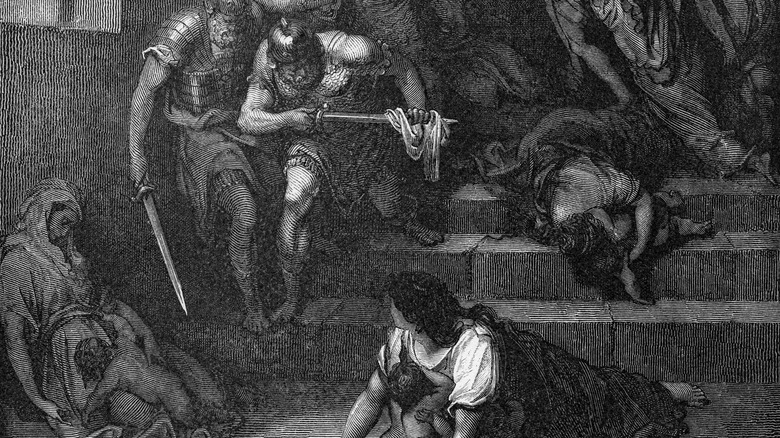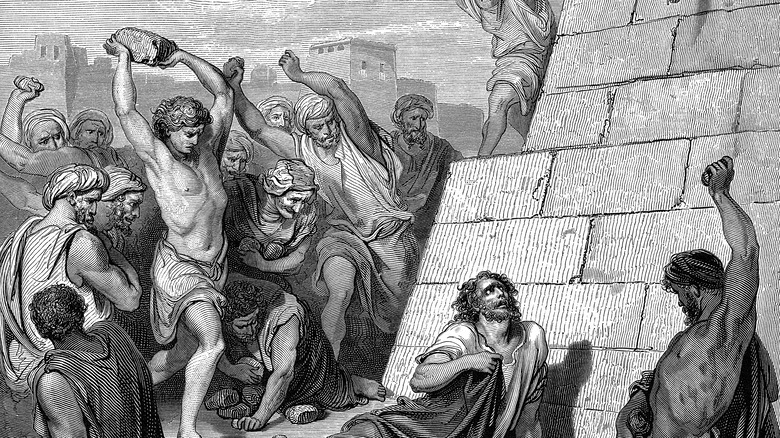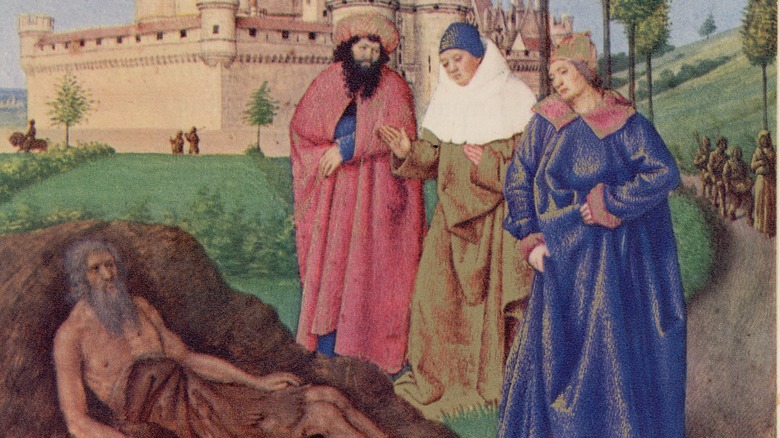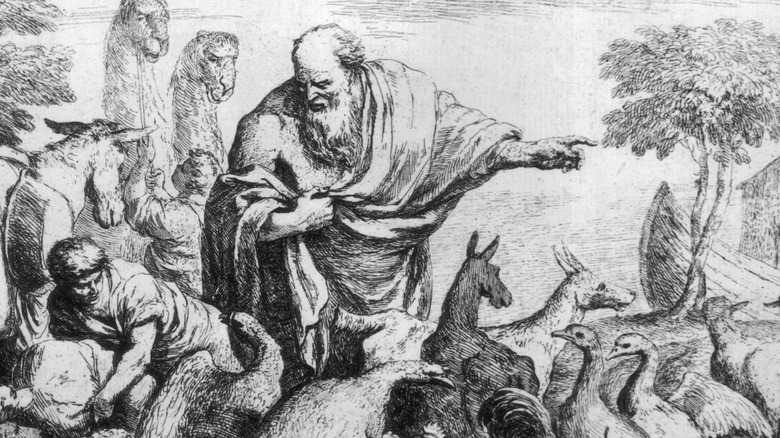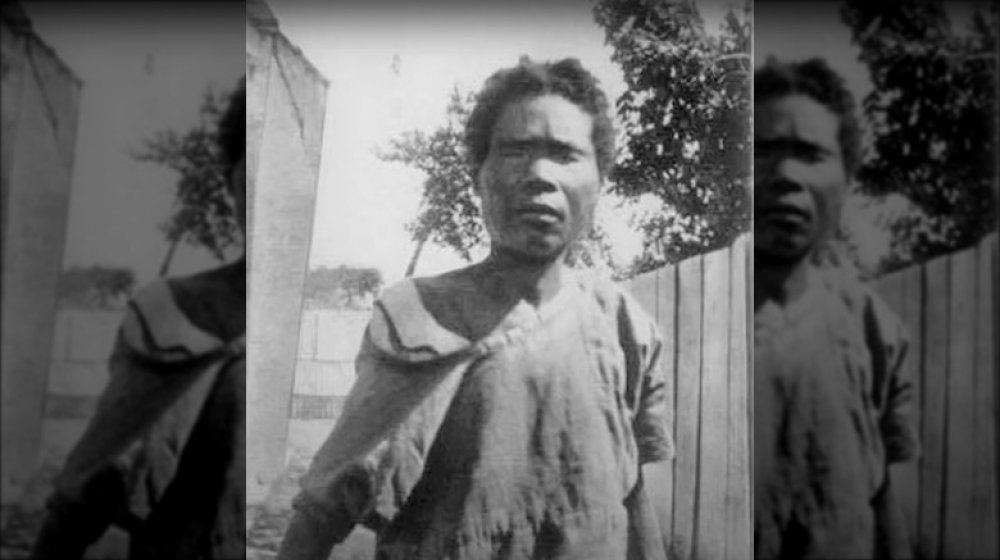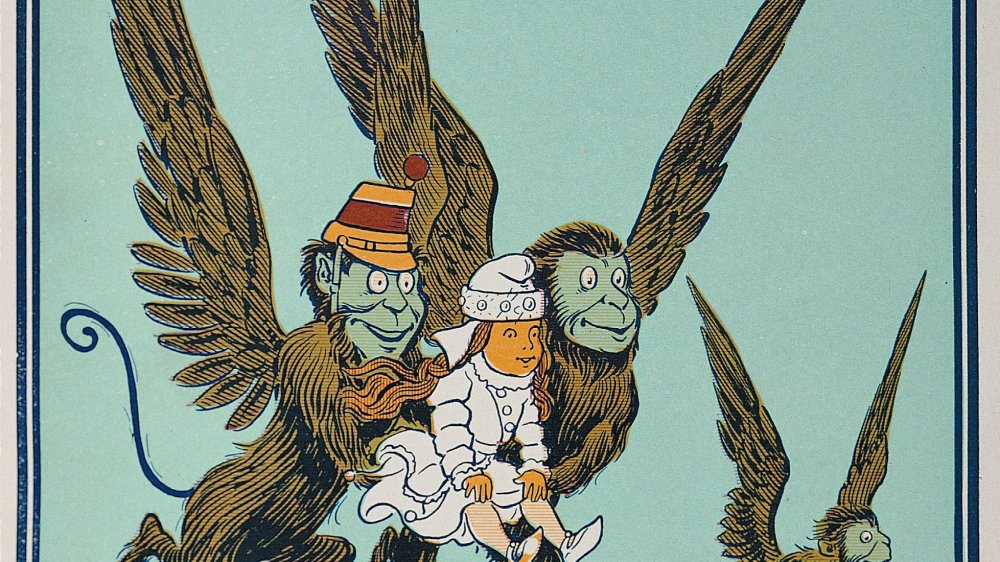
The Most Disturbing Parts Of The Bible Ranked
The following article includes references to violence, incest, and sexual assault.
The Bible is full of beloved stories. Passages from it are often read at weddings, stories from it are often told to children, and its themes have inspired countless modern books and movies, from the Matrix to the Chronicles of Narnia. According to Mark. A. Noll’s article, “The Bible and American Culture,” “The Bible has been a permanent fixture in American culture since the beginning of the European settlement of North America.”
From animal attacks to cannibalism, many parts of the Bible would be totally inappropriate to bring up at a wedding, let alone tell to children. The following parts of the Bible eem better suited to a horror movie than a bedtime story. Some aren’t particularly well-known (and it’s easy to understand why!) and others are probably familiar, but when examined more closely are definitely disturbing. These are the most disturbing parts of the Bible ranked.
13. Skeletal visions
In Ezekiel 37:1-14, the prophet has a vision of a valley filled with dry bones. On the instructions of God, Ezekiel tells the bones to come to life. He hears a strange rattling. The bones are coming back together, building themselves into skeletons. Tendons, flesh, and skin grow on the skeletons, but they are still dead. Again, on the orders of God, Ezekiel restores the bodies to life, creating a vast army. God tells Ezekiel to tell his people, “I am going to open your graves and bring you up from them; I will bring you back to the land of Israel.”
While skeletons growing flesh might seem like a scene from “Hellraiser,” Ezekiel’s vision is meant to uplift readers. Ezekiel’s vision occurs while he and his people are exiled after the destruction of the temple. A quotation in “The Restoration Of The ‘Dry Bone’ In Ezekiel 37:1-14: An Exegetical And Theological Analysis,” states that God, “put on such an unbelievably dramatic display purposefully ‘to combat the despair which had settled upon the [agonising] exiles.'”
Some interpret this story as a promise that there will be an afterlife, but it can also be read as a call to keep faith despite being persecuted. According to the Financial Times, this made the story popular with Black ministers at the end of the 19th century. This was the inspiration for the classic spiritual song “Dem Bones.”
12. Division
The Tower of Babel is a just-so story, explaining why people speak different languages. In Genesis 11:1-9, everyone speaks the same language, and because they can communicate, they are able to cooperate. The people of the world come together to build a massive city, with a tower so tall the “top is in the heavens.” When God sees the tower, he is disturbed by how much humans can accomplish by working together. God decides to scatter humans across the Earth, and “confuse their language, that they may not understand one another’s speech” so that people would never be able to work together again.
As noted in “The Tower of Babel and the Origin of the World’s Cultures,” the most common interpretation of the story is that God is punishing mankind for its pride, but some people choose not to read the story as not being about the origin of languages or God trying to prevent collaboration. Instead, they explain God’s behavior in Genesis 11:1-9 as being a criticism of empire-building imperialism. The article states: “The emphasis on one language at the beginning of the story represents the imperial suppression of local languages and cultures, and God’s punishment brings down the empire … setting free the local languages and cultures to flourish.”
11. Gruesome deaths
The Bible is full of violent deaths, but the fates of two enemies of Christ -– King Herod and Judas Iscariot -– are particularly grisly.
According to H. Ashrafian’s article “Herod the Great and his worms,” the king is “famed in Roman history as a great builder and a diplomat, whilst in the Bible he is portrayed as the deceiver of the Magi and a genocidal maniac.” This assessment of his depiction in the Bible is mostly due to the story in which Herod had all infants executed in the hopes that he would also kill the baby Jesus. In Acts 12:20-23, “an angel of the Lord” smites King Herod in a particularly gruesome way: he is devoured by worms.
“The Death of Judas: The Characterization of Judas Iscariot in Three Early Christian Accounts of His Death” outlines the “three different accounts of the death of Judas Iscariot .. .in Matthew 27:3-10, Acts 1:18-20, and fragments of Papias.” The version in Acts:18-2 is the most brutal -– he falls, his body “burst asunder,” and his viscera and organs “gushed out.”
10. Casting stones
As explained in Irene Merker Rosenberg and Yale L. Rosenberg’s paper “Of God’s Mercy and the Four Biblical Methods of Capital Punishment: Stoning, Burning, Beheading, and Strangulation,” there are four methods of execution used in the Bible.
“Stoning” refers to a group of people throwing rocks at a condemned person until they are killed. Sometimes the condemned person would be naked, which would allow the blows to kill them more quickly. While there was a “principle that a condemned person is entitled to a ‘favorable death,'” this method seems particularly excruciating and humiliating.
In Deuteronomy, some situations are outlined that would merit someone being stoned to death. Deuteronomy 21:18-21 states that if there is “a stubborn and rebellious son” who won’t listen to his parents, “all the men of this city shall stone him to death.” Deuteronomy 22:13-21 states that if a man believes his wife was not a virgin when they married, and her father cannot provide proof of her virginity, then “all the men of her city shall stone her.”
9. Slavery
Exodus 20-21, which contains familiar Ten Commandments rules such as “Thou shalt not kill” and “Thou shalt not steal,” also has rules about buying and selling human beings as “servants” and how they should be treated by their “masters.”
One line states that if a “servant” dies while being beaten by their “master” then “he shall be surely punished.” However, if they survive for “a day or two” after the beating, there will be no punishment for the “master.”
This representation of slavery in the Bible has been used to justify slavery in modern history. According to Larry R. Morrison’s paper “The Religious Defense of American Slavery Before 1830,” “the emphasis from proslavery defenders was always upon a literal reading of the Bible which represented the mind and will of God himself. Slavery was not only justified but also moral because it was recognized as such in the Holy Scripture.”
8. Misogyny
In Leviticus 12, God tells Moses that if a woman gives birth to a son, she will be “ceremonially unclean for seven days, just as she is unclean during her monthly period.” It goes on to state that it will take 33 days to be “purified.” If the baby was a girl, it would take twice as long. The new mother must also bring sacrificial animals to her priest as “a burnt offering” and “a sin offering.”
Deuteronomy 22:28–29 states that if a woman is a virgin, and a man “seizes her and lies with her,” he must pay her father a fine. Then the woman and her rapist must get married, and they can never get divorced.
Some have attempted to read these rules in a way that is less harsh towards women, such as the interpretation shared by Women in the Scriptures, which states that women are unclean after birth “because when she was pregnant she was filled with potential life and the spiritual power of creation. When her child is born that spiritual power departs and she becomes tuma [unclean]. In addition by bringing a new child into the world she has also brought more death, because each child who lives must also one day die.”
Others have pointed out that although these rules are in the Old Testament, Jesus is not depicted as following them in the New Testament. “Women in the Ministry of Jesus” describes “Jesus’ dismissal of distinctions of clean and unclean.”
7. Human sacrifice
Although, as noted by the BAS Library, human sacrifice would be considered an abomination by Biblical rules, the Bible does include stories of people planning to sacrifice human beings -– including their own children.
Many are familiar with the story in Genesis where Abraham is told to sacrifice his only son to God as a test of his loyalty, only to be stopped at the last second by an angel. Jephthah, the “ancient Israelite judge and warrior” was not so lucky, however.
In Judges 11:30-31, Jephthah swears to God that if he is victorious in his upcoming battle he will make a burnt offering sacrifice of “whatever comes out of the door” of his home when he returns. In a chilling twist, when Jephthah returned, it was his young daughter who came out of the house to greet him. Judges 11:39 states that he then “did to her as he had vowed.”
6. Killer bears
There are many more risks to children in the Bible than being sacrificed. In 2 Kings 2:23-24, the prophet Elisha is walking on a road when a group of “little children” start mocking him for being bald. Elisha then curses them, and immediately two female bears run out of the woods and maul 42 of the children to death.
The most common interpretation of this story is that everyone should respect authority, because God won’t tolerate anyone, even small children, making fun of his representatives. However some modern Christians, such as 1517, argue that “little children” was actually a mistranslation, and it is actually supposed to be 42 male servants who were killed by bears. They also argue that the reason that they were killed wasn’t as seemingly petty as it appears, and that rather than Elisha being offended by taunts about hair loss, the bears were called to kill the group because they worshipped different gods.
5. Testing loyalty
As explained in Matitiahu Tsevat’s “The Meaning of the Book of Job,” the Book of Job addresses the question of why bad things happen to good people. In Job’s case, it’s because of a bet.
Job is a pious man. Even God himself says that “there is no man on earth as blameless and upright as he.” However the Devil (called “the accuser” or “the adversary”) suggests to God that Job is only so loyal because he has “God’s blessing” and has a wonderful life. God accepts the Devil’s challenge, and decides to test Job’s loyalty by taking away everything he has.
God kills Job’s children and destroys his home. Job continues to praise God. Then God has the Devil give Job a horrific skin condition. His friends believe he must have sinned, or God wouldn’t have punished him, because “the just man is rewarded, the sinner punished.” Job on the other hand argues that he isn’t being punished, instead it’s just that “God wants to torment him, without reason. God is cruel.”
God tells Job that He is all-knowing and Job is not, saying, “You know little of the world and can do less about it.” Ultimately, God gives Job everything he had before and more (although some critics argue that the chapters detailing Job’s restoration are not from the original book.)
4. Murder and dismemberment
The story of the Levite and the concubine is a brutal one. According to Heidi Szpek’s “The Levite’s Concubine: The Story That Never Was,” the young woman called a “concubine” was likely the Levite’s second wife. The two are traveling, and looking for a place to spend the night. They are invited to spend the night in someone’s house, but ominously warned “do not spend the night in the square.”
That night “the men of the city, a perverse lot, surrounded the house.” This group demands that the group’s host send the Levite out so they can have their way with him. To save himself, the Levite forces the concubine out to the mob. She does not survive the night.
The next morning, the Levite discovers the concubine’s body outside the door to the house. He told her to “get up … but there was no answer.” He brought the body back home with him, and “cut her into twelve pieces,” and sent each part of the dismembered corpse to a tribe of Israel, as a “cry for vengeance.”
This story might seem uniquely horrific, but there is another story that begins in almost exactly the same way, with a violent mob surrounding the house, only to be offered a sacrifice.
3. Sexual violence and incest
The story of Lot and his daughters in Genesis 19:4-8 has a similar premise to the story of the Levite and the concubine, but ends very differently.
Two angels come to Sodom. They had planned to spend the night in the town square, but, like the Levite’s host, Lot urges them not to. Instead, the two angels stay with Lot’s family. That night, every single man in Sodom surrounds the house and demands that Lot send the two angels out.
Lot makes the mob a horrific offer: “I beg you, my brothers, do not act so wickedly. Behold, I have two daughters who have not known any man. Let me bring them out to you, and do to them as you please.” The mob refuses.
The city of Sodom is going to be destroyed by God, so Lot and his family make their escape, but Lot’s wife is turned into a pillar of salt for looking back at the burning city. This leaves Lot alone with the two virgin daughters he tried to sacrifice.
By Genesis 19:30–38, Lot and his daughters have gone into hiding. The two young women worry that they will never have children since they aren’t able to meet any men. As described in “The Daughters of Lot,” the two decide to “make our father drink wine and then lie with him and this way keep the family alive.” Their plan works. Both daughters become pregnant by their own father.
2. Cannibalism and infant death
There are many forms of violence against infants in the Bible, but one of the most horrific incidents take place in 2 Kings 6.24-33.
As detailed in Stuart Lasine’s article “Jehoram and the Cannibal Mothers (2 Kings 6.24-33): Solomon’s Judgment in an Inverted World,” the king is asked to rule on a particularly horrific case. The kingdom is going through a terrible famine, and when a woman asks for an audience, the king assumes she is there to ask for food. The truth is much more sinister.
The woman is there to ask for help because her friend didn’t go through with her side of a deal. When all of the food ran out, the two women made a bargain: that they would kill and eat their own infant children.
“This woman said to me, ‘Give your son, that we may eat him today, and we will eat my son tomorrow.’ So we boiled my son and ate him. And on the next day I said to her, ‘Give your son, that we may eat him.’ But she has hidden her son.” The woman seems to hope that the king will force her friend to give up her child, but all he does is tear at his clothes.
1. Genocide (and incest again)
Noah’s Arc is probably one of the best known Bible stories. This is partially because all the animals in the story make it appealing to children. In fact, it is often considered a good bedtime story. However, when examined, the story is anything but kid-friendly.
In Genesis, God intends to “wipe from the face of the earth every living creature I have made” because he feels that they have sinned. He warns Noah, so they will have enough time to build a boat large enough for him, his wife, and his three sons and their wives –- as well two of each kind of animal.
As described by PBS, God sends the flood and it kills every single living on the planet. The only survivors are those on the ark. They are left to repopulate the earth – in fact they are specifically told by God to do so in Genesis 9:7, when God instructs: “As for you, be fruitful and increase in number; multiply on the earth and increase upon it.”
However, because there was only one pair of each animal and eight humans on the arc, this means that all the animals on the planet would be from only two animals, and every human would be incestuously descended from Noah’s children.
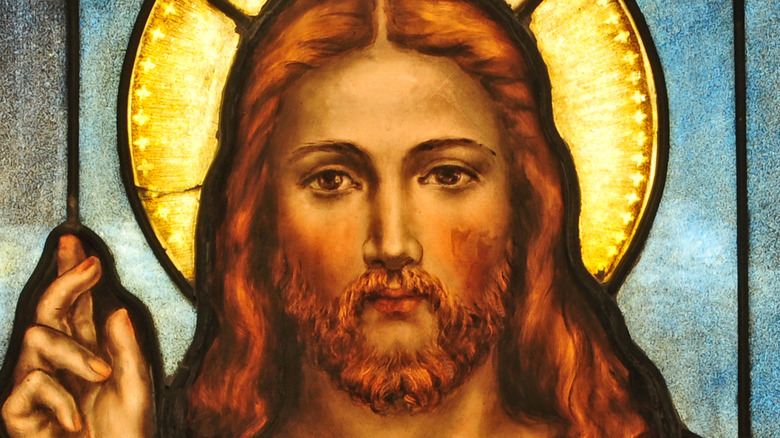
The Untold Truth Of Jesus

The Mysterious Story Of The Green Children Of Woolpit
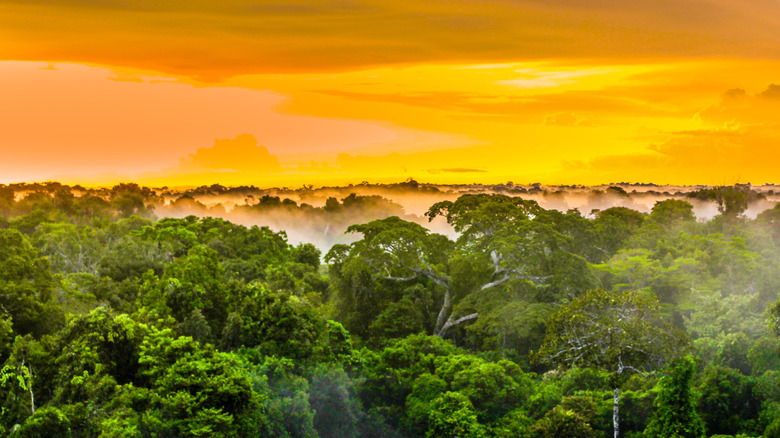
Mysteries Of The Rainforest You've Never Heard Of

The Truth About Ric Flair And Hulk Hogan's Feud

The Olympics: Most Famous Athlete From Every State

What You Didn't Know About The Pet Mozart Had

How The Knights Templar Got Their Name

The Real Reason Mormons Don't Want To Be Called Mormons Anymore

How The Government Helped Make Saturday Morning Cartoons Disappear

The Real Reason MTV Stopped Playing Music Videos


